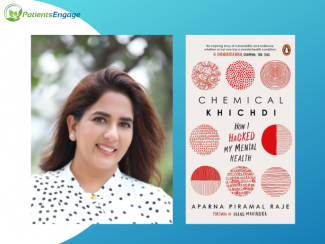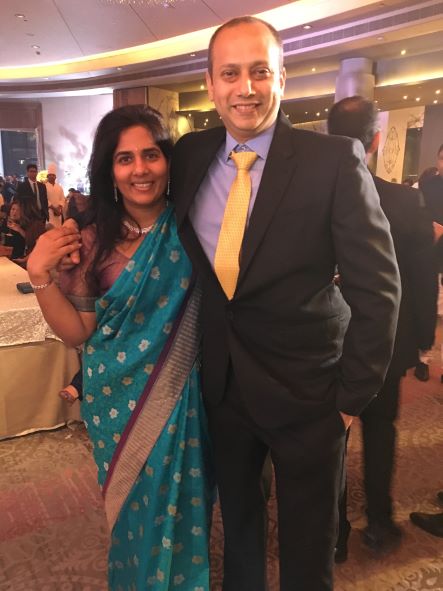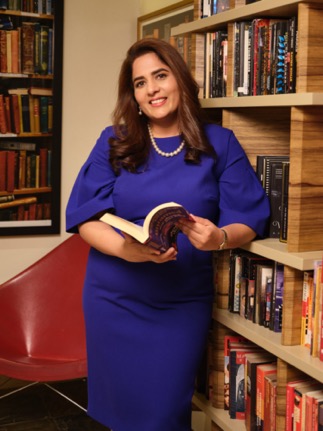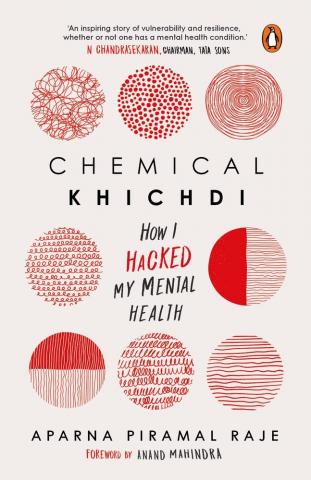
Aparna Piramal Raje, writer, educator and adviser, has been living with bipolar disorder for 20 years. In her latest book ‘Chemical Khichdi’ she brings us close to her manic depression, her vulnerability and therapies that have helped her succeed. Read her captivating and candid first hand account.
Let me begin by congratulating you. Your book ‘Chemical Khichdi – How I Hacked my Mental Health’ on your personal experiences with bipolar disorder is being considered a significant read and a milepost. What was the underlying objective of writing your narrative?
I thought my story could help individuals and their loved ones in managing mental health conditions beyond bipolarity. In 2014, about 18 months after I was officially diagnosed, I wrote a note called ’10 things I’ve learnt about being bipolar’ for my immediate family, friends and medical professionals. My book club in particular liked it and thought it could turn into a book, and that’s when the idea of the book was first conceived.
The title of your book ‘Chemical Khichdi’ captivates as well as piques. How did you select the title? What does the subtitle imply?
‘Chemical Khichdi’ is a playful reference to my moment of realisation and acceptance, from about a decade ago, that I was dealing with a mental health condition with chemical imbalances. There is a poem in the book by that title. We thought it would be a catchy title and draw attention to this fact that these are genuine chemical imbalances in the brain and need treatment. The subtitle implies that I have found ways to ‘hack’ my mental health in the form of solutions in how to live and thrive with it, which have worked for me.
You have battled bipolarity for over 20 years, which was overlooked or misdiagnosed for a long time. When and how did you finally get an accurate diagnosis for your bipolar disorder symptoms?
My extreme mood swings were of concern to my family when they first occurred in my mid-20s, but it was unclear at the time whether I was bipolar, or a borderline case, and whether or not I needed medication (which we were not keen on as a family). I went to a therapist early on, which was very helpful, but in the end not sufficient on its own as a form of treatment. Around 10 years ago, I was psychotic and manic in a yoga ashram in Bihar and couldn’t travel back to Mumbai on my own or take care of myself. It was obvious at that time that I needed medical attention, and that was when we found a psychiatrist that we liked, we accepted the diagnosis and started medical treatment.
You hail from a well-known business family, you are married, you have two children – your life seems normal and complete. Which are two aspects of your life which gets affected the most because of your bipolarity?
I think every aspect of one’s personal and professional life gets affected at times of turbulence. It becomes difficult to work, my family (including my children) can see that I’m not myself, it affects all aspects of daily functioning. Luckily, I’ve been in a good place for over four years now. In the past two decades, there have been long stretches of ‘normalcy’ or equilibrium, even as there have been weeks of mania, hypomania and depression.

Above: Aparna Piramal Raje with her husband Amit Raje
‘You can live with a vulnerability without becoming a victim’ – says Anand Mahindra, chairperson Mahindra Group, in the Foreword of your book. Have there been occasions when you felt like a victim?
In general, I’m a very optimistic person and I feel fortunate and grateful for so many blessings I’ve received, so I don’t look at myself as a victim. Yet living with a mental health condition for so many years has been a struggle on many fronts. I try and look at struggle as a vehicle for self-growth, and I also see bipolarity as a source of illumination, as my guru which has taught me a lot, about myself, about the human condition, about life.
How do you juggle around your numerous roles as a columnist, writer, visiting faculty & speaker on business, design, workplaces and mental health advocate - despite your bipolarity which could result in extreme shifts in mood that are unpredictable and often disruptive to daily functioning?
The most important element in making this all work is flexibility. Most of my commitments have a lot of flexibility built into them. Even before I wrote Chemical Khichdi, I was open with all the organisations I work with, and my managers, of my condition. And so when there were incidents when I was unwell and unable to work, they were able to find substitutes. It hasn’t happened too often, but it has happened and I’ve been lucky that I’ve been given second chances, which have paid off for the organisation and for me in the long-run.

You have maintained that mania and depression are consequences of chemical imbalance, but the triggers are psychological. What are some of the major triggers have you faced?
Mainly interpersonal conflict, work-related stress and need for validation. My search for a better understanding of identity, purpose, success, happiness and meaning has helped me understand these triggers a lot better.
From the highs of mania and hypomania to the lows of depression, it can be a lot to manage. Who has been your biggest anchor and source of strength?
For me, mental health is a team sport. If it takes a village to raise a child, it takes a community to heal a mind. And I’ve had many on my team – my immediate and extended family, my friends, mentors, colleagues, medical professionals and more. I’ve also made it a point to reach out to a lot of people and share my vulnerability, which individuals with mental health conditions don't always do.
Post-mania recovery is always a struggle. What were your prime activities to reconstruct your life?
Thank you for highlighting that. I rely on healing everyday rituals – spending time with my children, exercising, sitting on my swing and listening to music, not really going out much – until I can get back to work, and my energy levels and sleep routines are well established. This recovery time is very critical because manic phases are tough emotionally, mentally and physically.
You book has an honest, brave and insightful accounts of your bipolarity. Did you ever hesitate to make your memoir so candid?
My goal was to take the reader as close to my mind as possible, to capture how raw and intense it can be. There are several other such memoirs already, in India and elsewhere, which are all candid and honest, so I didn’t think I was doing anything that new, from a writing point of view.
The second part of your book dwells on The Seven Therapies like Medical Therapy, Love Therapy, Work Therapy, Self-Therapy, Spiritual Therapy, and Lifestyle Therapy that kept you well-balanced. Could these therapies be recommended for treatment of bipolar disorder?
These therapies are all drawn from everyday life, and I think they are helpful to anyone (and those in their ecosystem) who want to enhance their emotional and mental well-being, not just those living with bipolarity. This has been validated by medical professionals who have read Chemical Khichdi too. To my mind, mental healthcare needs a holistic approach as outlined in these seven therapies for greater chances of recovery.
How do we make mental health more accessible and inclusive, especially for people at the lower end of the pyramid?
Making more resources available, in the form of mental health professionals is a necessary starting point. But more awareness of mental health itself is critical – I don’t think these words are really understood in all parts of our country. There are more nonprofits and startups working to make mental health accessible and inclusive, and I’ve included some in Chemical Khichdi in a list of resources at the back of the book.
Chemical Khichdi also sets out to debunk some myths and misconceptions about mental health. Which are two of the most commonly misunderstood beliefs about mental illnesses?
I want to establish that it is possible to live with a serious mental health condition like bipolarity, and continue to have a family and a career. In other words, debunk the myth that one can’t live the life that one wants to live, if one has such a condition.
Also, separating personality from illness is really important. It is very easy for us to attribute changes in behaviour, which could be due a mental health condition like depression or anxiety, to personality. These conditions need to be understood as medical conditions and treated in the same way as we would treat physical conditions.
What should someone with bipolar do to ‘thrive’? Could you give us 5 key tips from your life?
I will answer this slightly differently. According to me, of my seven therapies, three are necessary just to ‘survive’ - medical therapies (talk therapy and if required, drug therapy), love therapy (the role of caregivers) and lifestyle therapy (sleep, exercise, nutrition and play). It is really important to be on top on these three therapies to just manage the condition, and unfortunately most people struggle with just these three, as we did initially too.
To go from ‘surviving’ to ‘thriving’, there were four other therapies that worked for me:
1.Work therapy: finding the right bandwidth of work. Too much work can be stressful, too little work is depressing. So finding the right amount of work where it can be therapeutic and not a stressor.
2.Allies and the therapy of empathy: Find allies you can trust. My allies help me in peacetime, preventing the wartime from happening, i.e. they help me manage my emotions on a daily basis so that there is less escalation of thoughts and emotions. Allies include my friends, my mentors and my networks to whom I turn to on a regular basis for friendship, support, companionship – and fun. As I said earlier, mental health is a team sport. We need to remember who is on our team and whose team we are on too.
3.Self-therapy: Have a private, honest conversation with yourself. I have done a lot (and continue to do so) of self-reflection over the years, mainly through a journal where I share my thoughts and emotions, to analyse why I am feeling the way I am, and try and see what I can do about it. This has been a big part of my therapy, as it helped me to identify and address my triggers in a meaningful way.
4.Spiritual therapy: Think of something bigger than yourself. Spiritual therapy has helped me to understand so much more about life, the human condition, purpose and meaning. It is uplifting, and open to anyone, they don’t have to follow a particular faith. We have a lot of resources for seekers in our country.
Join the mental health community if you are a person with mental illness or a caregiver
I believe you read quite a number of mental health memoirs before starting your book. Could you mention three which left a deep impact on you?
- I liked Kay Redfield Jamison’s An Unquiet Mind – it was the first mental health memoir I read, and was very inspiring, it is an international bestseller.
- I also liked Shreevatsa Nevatia’s How To Travel Light, it was brutally honest and especially interesting being an Indian book.
- Hurry Down Sunshine by Michael Greenberg was compelling from a parent’s perspective.
- And Em and the big Hoom by Jerry Pinto was beautiful as a semi-autobiographical novel, from the viewpoint of an offspring looking after a bipolar parent.
As told to Shivani Maheshwari







